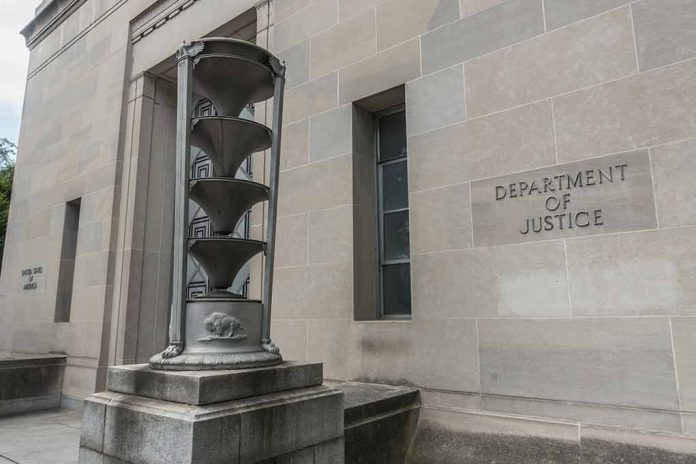
The Department of Justice stands resolute against contempt allegations amidst their legal confrontation with Judge Paula Xinis.
Key Takeaways
- The DOJ firmly denied defense’s motion alleging government contempt in Kilmar Armando Abrego Garcia’s deportation case.
- U.S. District Judge Paula Xinis ordered daily updates on efforts to return Abrego Garcia to the U.S.
- The DOJ emphasizes the separation of powers, arguing that courts cannot dictate foreign policy to the Executive Branch.
- The Supreme Court directed the Trump administration to facilitate Abrego Garcia’s return; DOJ’s interpretation focuses on domestic measures.
- Abrego Garcia’s legal team may pursue further judicial action if governmental updates remain insufficient.
DOJ Criticizes Court Order
In the ongoing legal battle regarding Kilmar Armando Abrego Garcia, the Department of Justice has strongly contested legal moves threatening its stance. Following a controversial deportation, which saw Garcia mistakenly sent to El Salvador, DOJ attorneys have pushed back against a defense motion seeking to hold the government in contempt. They firmly denied any misconduct, underscoring their unwavering posture against challenges to their authority.
Judge Paula Xinis has ordered continuous updates on the status of Abrego Garcia, pressuring the administration for daily reports. Despite these court directives, the Department of Justice remains skeptical, citing complexities in meeting judicial expectations while respecting international relations and emphasizing limitations to court authority over executive foreign policy duties.
A deputy assistant attorney general told the judge overseeing the case of Kilmar Armando Abrego Garcia, the Maryland man who was deported to El Salvador in error, that he does "not have the information" regarding Abrego Garcia's whereabouts. https://t.co/KcZDdBsLDf
— ABC News (@ABC) April 11, 2025
Supreme Court’s Involvement
The case intensified with the involvement of the Supreme Court, which upheld the lower court’s ruling that the government should take steps to bring Garcia back. The Trump administration sought to interpret this as requiring domestic facilitation, not necessarily orchestrating his return from abroad, a point of contention with Garcia’s legal team urging faster action.
“The Supreme Court upheld the District Judge’s order that the government has to bring Kilmar home. Now they need to stop wasting time and get moving,” said Simon Sandoval-Moshenberg.
The DOJ’s stance emphasizes the importance of executive powers in handling international relations, arguing that such directives overstep judicial boundaries into the domain reserved for the Executive Branch. This interpretation coexist with pressures from opposing legal counsels to expedite Garcia’s return.
Judicial and Executive Dispute
This confrontation between judicial expectations and executive privileges continues to illuminate the friction between branches. The DOJ’s interpretation serves as a reminder of the intricate balance of powers at play in such international matters. While the courts pursue daily accountability, the administration stands its ground on maintaining its foreign policy prerogatives.
“Any further intrusion into this sensitive process—and any directive from the Court to take action against the nation of El Salvador—would be inconsistent with the care counseled by the Supreme Court,” the government said.
Abrego Garcia’s location remains a sensitive topic, with reports confirming his safety in El Salvador yet detaining under local authority. This legal saga will undoubtedly persist as the court pressures the Trump administration for compliance, with both parties resolute in their interpretations of justice and due process.
Sources:
- ‘Nothing has been done’: Judge slams DOJ in case of wrongly deported man – ABC News
- DOJ: Courts have ‘no authority’ to force Abrego Garcia’s return
- Trump’s Department of Justice Tells Judge They’re No Longer Amused Playing Her Silly Games – RedState














